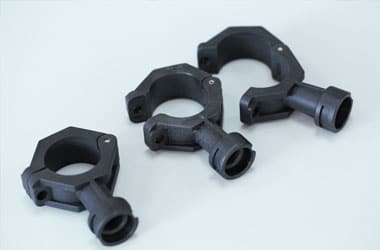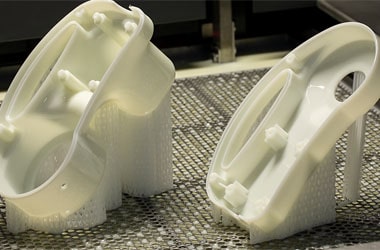Rapid Tooling Services
Rapid tooling, sometimes known as prototype tooling or bridge tooling, is a fast and cost-efficient way to carry out low-volume injection molding for a variety of types of plastic parts. Once the aluminum or steel mold has been created with the rapid tooling process, it can be utilized as part of a molding process to create multiple copies of a part. Rapid tooling is therefore used to create moldings for rapid prototyping needs in a shortened timeframe, or to bridge the gap before high-volume production.
At 3ERP, we combine our experience, engineering capabilities and advanced technology to produce high-quality rapid tooling solutions for prototypes and short production runs. Our team works directly with each customer to ensure that we create the perfect solution. Our experience speaks for itself. The team at 3ERP is well-equipped to handle your rapid tooling and mass production mold making requirements. If you are ready to start mass production, learn more out our injection molding services.

Economy of Scale
In most cases, rapid tooling is the most cost-effective option for an order of 100–2,000 units: too many for 3D printing, CNC machining, or urethane casting, but not enough to justify mass production tooling.

Economy of Scale
In most cases, rapid tooling is the most cost-effective option for an order of 100–2,000 units: too many for 3D printing, CNC machining, or urethane casting, but not enough to justify mass production tooling.

Economy of Scale
In most cases, rapid tooling is the most cost-effective option for an order of 100–2,000 units: too many for 3D printing, CNC machining, or urethane casting, but not enough to justify mass production tooling.

Economy of Scale
In most cases, rapid tooling is the most cost-effective option for an order of 100–2,000 units: too many for 3D printing, CNC machining, or urethane casting, but not enough to justify mass production tooling.
See why our cusomers love us




Benefits of Rapid Tooling
There are huge numbers of CNC machining service providers. Why should you choose us? Here are the top 3 reasons:
1. Experience
Our engineers have built up rich, deep experience from many previous projects, so they can handle complex and precision parts in several industries without a problem.
2. Advanced Equipment
3ERP has extensive in-house equipment for both manufacturing and testing. Your parts will be manufactured and inspected with our advanced in-house equipment, including HAAS 3-, 4-, and 5-axis CNC milling, Hexagon CMM, and Olympus XRF analyzer
3. Fast Turnaround
On average we return quotes within 24 hours, parts ship within 7 days or less, and we have a 99% on-time delivery and quality rate.
The Rapid Tooling Process
The rapid tooling process involves the creation of a mold using aluminum or soft steel, a stocked mold base, and hand-load inserts. Rapid tooling is one of the best methods for fulfilling small batch orders meant for use in marketing samples, product evaluations, and process design.
Traditional tooling is often prohibitively expensive for small projects. Our custom rapid tooling service is a cost-effective, low-volume alternative in situations where large volumes of the part won’t be needed in the future. The rapid production tooling process is commonly used in industrial settings for prototyping solutions or for diagnosing design issues, providing an easy introduction to mold making.
At 3ERP, we typically create rapid molds by CNC machining and EDM, though we also sometimes use additive methods such as 3D printing technologies.
Aluminum Mold or Steel Mold? Pros and Cons
Rapid Tooling & Mold Making Projects
Aluminum Mold Tooling
Steel is a sturdy, solid, high-quality tooling material, though it is not suitable for all applications. Steel molds have a longer life cycle than aluminum and are therefore ideal for high-volume production. Steel can also be used to produce molds from engineering-grade plastics that are resistant to abrasion and corrosion.
Though it features multiple benefits, steel is a more expensive tooling material than aluminum and requires more turnaround time to produce molds and prototypes.
Aluminum Mold Tooling
Steel is a sturdy, solid, high-quality tooling material, though it is not suitable for all applications. Steel molds have a longer life cycle than aluminum and are therefore ideal for high-volume production. Steel can also be used to produce molds from engineering-grade plastics that are resistant to abrasion and corrosion.
Though it features multiple benefits, steel is a more expensive tooling material than aluminum and requires more turnaround time to produce molds and prototypes.
Rapid Tooling for Tail Light Project
Can you imagine attempting to make prototype tools for over 30 components in just two months? Our customer desperately needed 200-300 sets of tail lights for testing, but mass production tools wouldn’t have been ready for eight months. They needed a solution to get good quality moldings by their deadline and at a much lower cost than production tools.
For this tail light project, we needed to fabricate a housing, reflector, light guide, bezel, an outer lens, and other components in a short period of time. The overall assembly size was about 600 x 400 x 150 mm, which is relatively large and the customer wanted to test real materials. In this case, 3D printing, CNC machining, and vacuum casting were not suitable, so prototype molding was the only option. Click to view this case
Rapid Tooling FAQ
Why should I use rapid tooling?
Rapid tooling is a fast and cost-efficient way to create a few prototypes in a selected material for function and aspect testing, as well as for low-volume manufacturing to test out the market.
How fast can I get the moldings?
This depends on the size and geometry of the parts. For a common open and shut mold with regular size part such as 300 x 300 x 50 mm, fabrication of tools and moldings can be done within 10 days.
What materials can I choose from with rapid tooling?
There is no limit to material choice. Any plastics available for mass production, including common silicone and rubber materials, can also be used with the rapid tooling process.
What is the quality level of rapid tooling?
Moldings from rapid tooling are end-use-parts quality. They are very close to mass production parts.
How many moldings can I get from rapid tooling?
Normally, aluminum molds are good enough for +/- 1,000 shots, while Steel P20 molds can last for +/- 10,000 shots.


